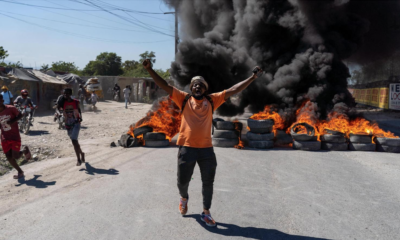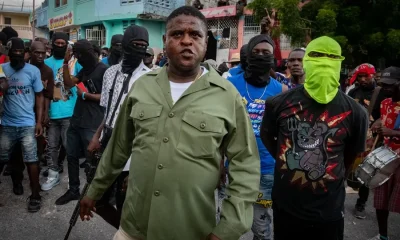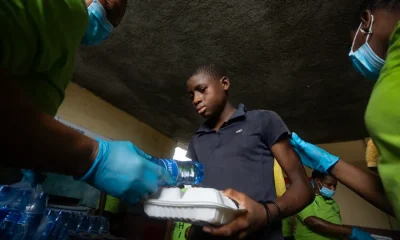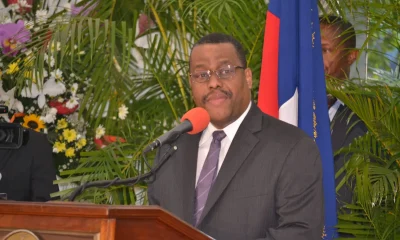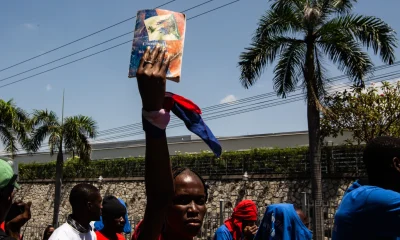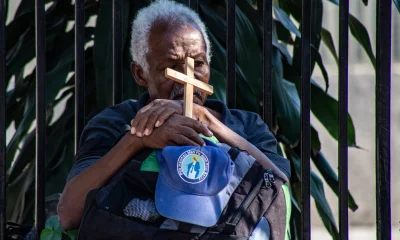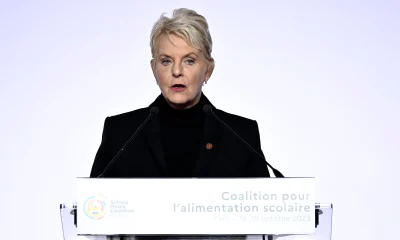International
Sunday of apparent tranquility in Haiti allows you to go to the market or to the church
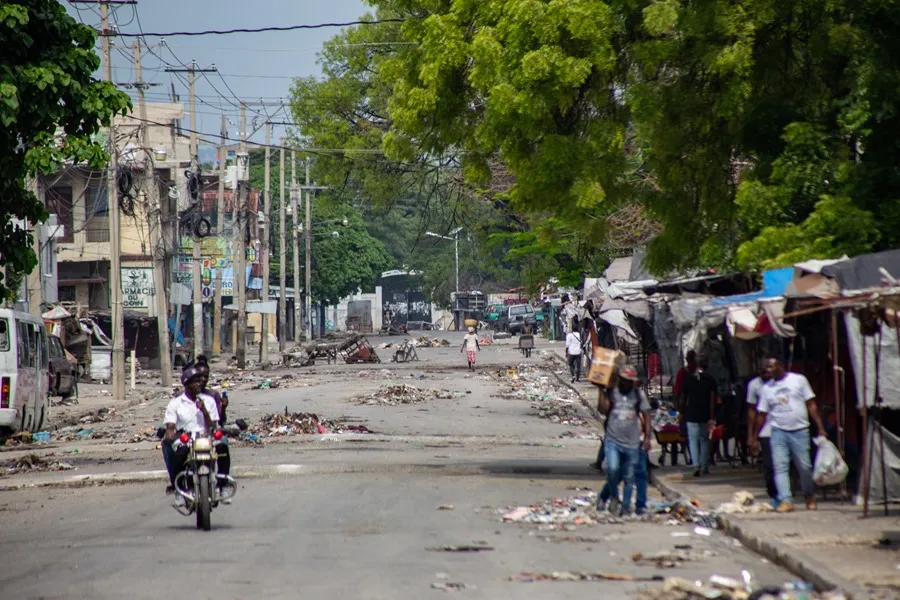
Port-au-Prince seems to live a truce of the struggle between the armed gangs and the National Police that has allowed the population to carry out some daily activities, in the context of the state of emergency decreed for the West department, which houses the capital of Haiti.
EFE was able to verify the movement in certain streets of the capital, even more than other Sundays, with people taking advantage of this relative tranquility to shop and stock up on basic products. There are also those who go to the church and others simply seek to leave the city.
Since last Thursday, the recurring armed clashes and the siege of public institutions recorded in recent weeks have not been recorded, a calm that has been maintained after the announcement, on Friday night, that the Presidential Transitional Council of Haiti finally reached a political agreement that outlines the road map to follow to return the country to the path of stability.
That does not mean that the police forces do not continue their fight against the gangs, which in recent days has found their stage at sea, allowing the recovery of the freight transport ship Magalie, the National Police of Haiti (PHN) reported on Sunday.
The Magalie cargo aircraft carrier, which was kidnapped by armed bandits of the Izo and Jeff gangs shortly after leaving the port of Varreux last Thursday with a shipment of rice, was recovered on Saturday with the logistical support of the National Port Authority.
After more than five hours of maneuvers and intense fighting by the intervention units of the Haitian National Guard, the operation resulted in the neutralization of several bandits, although two policemen were injured in the operation.
Another success of the security forces was the seizure of weapons and ammunition carried out on Friday in the Port of Cape Haitiano, a shipment that, as reported this Sunday by the PHN, came from the United States specifically from the company Alliance Int’l Shipping, from Miami.
The arsenal was intended for Jean Wilmane, Customs Commissioner, against whom the PNH has issued a search warrant, as well as against an individual identified as Barthol, who was listed as the recipient of the shipment, both known for their alleged participation in the trafficking of weapons and ammunition, the institution of order said.
During the operation, 26 firearms were seized, including 12 rifles and 14 pistols; 999 cartridges and 34 magazines discovered in two cardboard boxes.
However, despite the apparent calm, no one is safe from looting by the bandits, not even religious temples, such as the First Baptist Church of Port-au-Prince, which this Sunday expressed its sadness and shock for the acts of looting it has been suffering.
“La Pastoral informs you that the direct attacks of armed gangs against the Church since Sunday, March 24, continued and resulted this week in the looting of the temple. The sanctuary is stripped of all the equipment related to sound, projection, computers, ventilation, music, electronics, etc.,” the congregation said in a statement.
In the face of these acts, which they described as “sad, disgusting and shocking,” from the church called “a union of prayers, inviting the faithful to attend, if possible, the Evangelical Church closest to their place of refuge and to follow the services broadcast on radio and online.”
Praying is what is left for Haitians in the current situation that the failed nation is experiencing, where not even health care is guaranteed, since almost half of the health professionals left the country and those who stay have great difficulties to go to work.
The Ministry of Health highlighted the health crisis in Haiti coinciding with World Health Day on April 7.
In a statement, the institution highlighted that the stress resulting from violence and uncertainty “makes those who were not sick sick or at risk” of doing so and aggravates the state of those who already suffer from a pathology, prevents the progress of those who are in the process of recovery and leads to the death of seriously ill people.
International
Claudia Sheinbaum: Operation Against ‘El Mencho’ Was Based on Pending Arrest Warrants

Mexico’s President Claudia Sheinbaum on Wednesday rejected claims that the military operation that resulted in the death of Nemesio Oseguera Cervantes, known as “El Mencho,” leader of the Jalisco New Generation Cartel (CJNG), was carried out under pressure from the United States government.
Sheinbaum explained that the deployment of federal forces was aimed at executing outstanding arrest warrants against Oseguera Cervantes, who was considered one of the most wanted criminals in both Mexico and the United States.
“That was not the objective (to ease pressure from the United States). It is very important, and I want to repeat it. This individual had an arrest warrant, or several,” Sheinbaum said, referring to the operation conducted on February 22.
According to the president, the initial goal was to capture Oseguera Cervantes, but military forces responded after coming under attack during the intervention.
“The operation was to detain him. The problem is that they were attacked — the Secretariat of National Defense — and they responded at that moment,” she said.
The president insisted that the action was not carried out in response to external demands, although she acknowledged intelligence cooperation with the United States.
“It was not done in any way because of pressure from the United States, not at all. Of course, there was intelligence information from the United States that was used specifically,” she concluded.
International
Spain Denies Any Agreement to Cooperate with U.S. Military in Iran Operations
International
White House Says Spain Agrees to Cooperate with U.S. Military After Trump Threatens Trade Embargo

White House Press Secretary Karoline Leavitt said Wednesday that Spain has agreed “in recent hours” to cooperate with the U.S. military, following President Donald Trump’s threat to impose a trade embargo on Madrid.
Trump had warned of potential commercial measures after Spain reportedly refused to allow the Pentagon to use facilities at Spanish military bases for operations related to Iran.
“With respect to Spain, I think you heard the president’s message yesterday loud and clear, and I understand that in recent hours they have agreed to cooperate with the United States military,” Leavitt said during a press briefing.
She added that the U.S. military is currently coordinating with its counterparts in Spain. However, the president expects broader support.
“The president expects that all of Europe, all of our European allies, of course, will cooperate in this important mission — not only for the United States, but also for Europe,” Leavitt said.
Her remarks came in response to questions about Spain’s position and its role as a U.S. ally amid rising tensions surrounding operations involving Iran.
-

 International4 days ago
International4 days agoIran Reports 201 Dead, 747 Injured After U.S. and Israeli Strikes
-

 International3 days ago
International3 days agoBrazil’s Supreme Court Rejects Bolsonaro’s Bid for House Arrest
-

 International2 days ago
International2 days agoSpain’s Prime Minister to Address Nation Amid Trump’s Trade Threats
-

 International3 days ago
International3 days agoAnti-ICE Billboard Campaign Targets Immigration Spending in 31 U.S. Cities
-

 International4 days ago
International4 days agoPope Leo XIV Urges End to ‘Spiral of Violence’ in Middle East
-

 International1 day ago
International1 day agoWhite House Says Spain Agrees to Cooperate with U.S. Military After Trump Threatens Trade Embargo
-

 International3 days ago
International3 days agoTrump Warns of ‘Major Wave’ of Attacks as Iran Conflict Escalates
-

 International3 days ago
International3 days agoMexico Calls for Immediate Probe After National Dies in ICE Custody
-

 International2 days ago
International2 days agoNew York Announces First 2,000 Seats in Universal 2-K Program
-

 Central America2 days ago
Central America2 days agoGuatemala’s Attorney General Fails in Bid for Top Court Seat Amid Corruption Allegations
-

 International1 day ago
International1 day agoSpain Denies Any Agreement to Cooperate with U.S. Military in Iran Operations
-

 Central America1 day ago
Central America1 day agoNicaragua Held Responsible for Harassment of Opposition Prosecutor and His Family
-

 Central America3 days ago
Central America3 days agoPanama Canal Monitoring Trade as Middle East Conflict Disrupts Shipping
-

 International3 days ago
International3 days agoBolivia Orders Three Investigations Into Deadly Military Plane Crash
-

 International2 days ago
International2 days agoWarner Bros. Developing First ‘Game of Thrones’ Movie With ‘Andor’ Writer
-

 International1 day ago
International1 day agoClaudia Sheinbaum: Operation Against ‘El Mencho’ Was Based on Pending Arrest Warrants



























